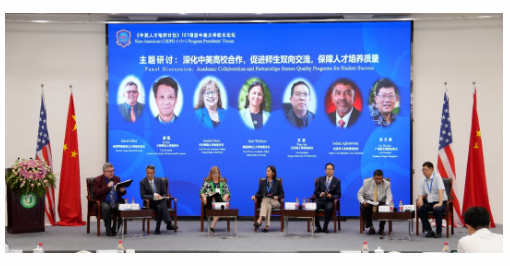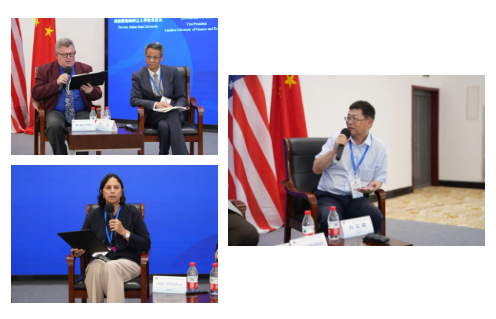Recently, the China-US University Presidents' Forum under the "121" Sino-US Talent Training Program 2024 was held at Jiangsu University. More than 120 presidents and representatives from 50 universities in China and the US attended the Presidents' Forum chaired by CAI Yingfeng, Vice President of Jiangsu University. Vice President Liu Wenbin of Nanfang College, Guangzhou was invited to attend and participate in the keynote speech, accompanied by Chai Jin, Deputy Director of the Department of International Cooperation and Exchanges.

The forum is themed "Deepening cooperation between Chinese and American universities, promoting two-way exchanges between teachers and students, and ensuring the quality of personnel training". Yang Jun, Secretary General of the China Education Association for International Exchange, Chen Dali, Deputy Director General of the Department of International Cooperation and Exchange of the Chinese Ministry of Education, Terry Brown, Vice President of the American Association of State Universities and Colleges, Alicia Edwards, Director of the Press and Cultural Office of the U.S. Consulate General in Shanghai, Zhou Yajun, Second Inspector of Jiangsu Provincial Education Department and Shen Yanfei, Deputy Director of the Foreign Affairs Office of Jiangsu Provincial People's Government addressed the opening ceremony.
Yang Jun pointed out that the "121" Sino-US Talent Training Program has set up a Sino-US platform for provincial and state exchanges in higher education, consolidating and expanding the depth of cooperation and exchanges between Chinese and Americann provincial/state and local universities. The cooperative partnership between the two sides showcases crucial importance. The mutual trust and cooperation between the two countries have laid a solid foundation for deepening people-to-people exchanges and enhancing mutual understanding between the Chinese and American youth. It is hoped that universities on both sides will grasp the core task of training young international talents, continue to work smoothly in two-way exchanges between young students, promote people-to-people exchanges between China and the United States through educational exchanges, and ensure the quality of talent training through professional services and high-quality educational resources.
Chen Dali said in his video address that the "121" Sino-Us Talent Training Program has been a typical project under China-US cultural exchanges, a strong platform for in-depth, wide-ranging and substantive exchanges between Chinese and American universities for more than 20 years. He hopes that Chinese and American universities will adhere to and enrich the cooperation for mutual benefit and win-win results and guarantee and enhance the quality of talent training. While promoting educational exchanges, Chinese and American universities shall also strive to contribute to the economic and trade development and regional cooperation between China and the United States.
Terry Brown said that the American Association of State Universities and Colleges (AASCU) values the long-term cooperative relationship with the China Education Association for International Exchange and the China-Education International Education Exchange Center as well as all Chinese universities. AASCU campus welcomes Chinese students and is willing to actively promote the Young Ambassadors Exchange program (YES) for 50,000 youngsters. She said that young students are envoys of exchanges between the two peoples, helping promote mutual understanding and respect between China and the United States.

The keynote session was moderated by David Silva, Vice President of Salem State University and Hu Kai, Vice President of Lanzhou University of Finance and Economics. Panelists including Janette Muir, Vice Provost of George Mason University, Julie Whitlow, Vice Provost of Salem State University, Wang Jun, Vice President of Jiangsu Institute of Technology, Sohail Angbotwala, Senior Vice President of Troy University, Liu Wenbin, Vice President of NCG and others focused on the establishment of the quality standard and evaluation system to 121 projects, the practice and value of the two-way exchange between Chinese and American students, the impact of international education on student achievement, the mutual trust and sustainability of the partnership between Chinese and American institutions, and the strengthening and expansion of the partnerships with new technologies in a new run. Creating a more diversified mode of cooperation and other topics were also discussed.
Panelists agreed that the Project 121 platform is of significant value. It enhances exchanges and mutual trust between China and the United States, promotes better understanding and friendship between the two sides, and cultivates qualified global citizens with the joint effort.
One of the most important outcomes of this forum is the joint proposal issued by present representatives from participated universities. The two sides propose that Chinese and American universities encourage students to study at each other's fields and provide necessary support to each other's students; Young Chinese and American students will deepen mutual understanding and friendship, laying a more solid foundation for the healthy development of China-US relations.